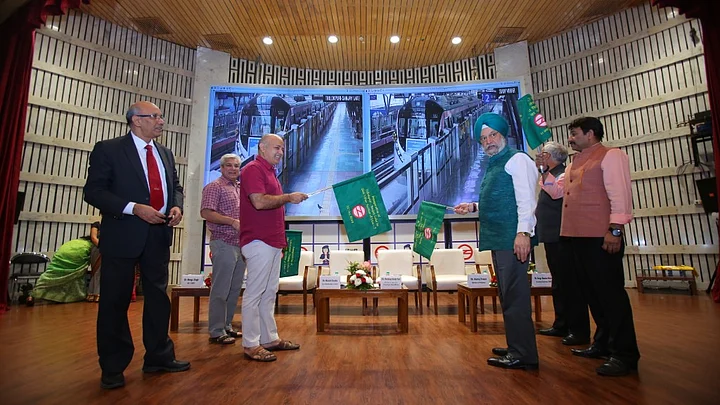The 17.8-km Shiv Vihar-Trilokpuri Sanjay Lake section of the Pink Line was opened to public on Wednesday, 31 October, putting Delhi among a select group of cities such as London and Shanghai that have an operational metro network of over 300-km.
The Delhi Metro network has now expanded to nearly 314 km with 229 stations with the operationalisation of the new corridor.
The new Anand Vihar metro station on this stretch, an interchange facility with an existing eponymous station on the Blue Line, has turned the area into a major transport hub, with a railway station and an Inter-State Bus Terminus (ISBT) already present.
Here’s what you need to know about the new section:
- The main highlight of this section is the presence of three interchange stations -- Anand Vihar (with Blue Line), Karkardooma (with Blue Line) and Welcome (with Red Line).
- Due to infrastructure constraints, trains on the Trilokpuri Sanjay Lake-IP Extension section on this corridor will ply on a single route with a frequency of a little 15 minutes and 36 seconds
- The 15 stations on the new corridor are – Trilokpuri Sanjay Lake, East Vinod Nagar-Mayur Vihar-II , Mandawali-West Vinod Nagar, IP Extension, Anand Vihar ISBT, Karkardooma, Karkardooma Court, Krishna Nagar, East Azad Nagar, Welcome, Jaffrabad, Maujpur-Babarpur, Gokulpuri, Johri Enclave and Shiv Vihar.
- The train services between IP Extension and Shiv Vihar section will be run as per normal practice on both the lines at a peak hour frequency of 5 minutes and 12 seconds.
- Passengers heading towards Trilokpuri or Shiv Vihar will be required to change the trains at the platform level itself at Maujpur-Babarpur station.
With its opening, the Delhi Metro also joined the league of top metro networks around the world which have an operational length of over 300 km, like those in London, Beijing, Shanghai and New York, Delhi Metro officials said.
Addressing a gathering at the inauguration function held at the Metro Bhawan on Wednesday, Union Housing and Urban Affairs Minister Hardeep Singh Puri said, "The journey that started in 2002 has passed the 300 km-mark today to reach 314 km. The metro project in Delhi is a global success."
After the opening of this line, the Delhi Metro will be running 4,749 trips a day, the "highest ever" so far, officials said.
A bottleneck near Trilokpuri station has arisen due to multiple issues, including land acquisition, resulting in a portion of metro segment, about few kilometres remaining incomplete, rendering the Trilokpuri Sanjay Lake station, a terminus.
Also, only every third train will go to Trilokpuri station from IP Extension due to the single line operation on down line due to non-availability of cross-over facility at Trilokpuri, Executive Director, Corporate Communications at DMRC, Anuj Dayal said.
"This interchange is necessitated since Maujpur-Babarpur is designed to meet Phase-IV requirement as an interchange station with four platforms," Dayal said.
In construction of this section, the Delhi Metro has achieved a rare feat in metro construction by crossing over its existing operational line (Blue Line) at the Karkardooma Metro Station (old one) at a record height of 21 m above the ground, making it the second highest structure in the network.
The highest point in the metro lies in Dhaula Kuan area, between Mayapuri and South Campus metro stations of the Pink Line, at a height of 23.6 m as high as a seven-storey building.
Also, the metro has constructed a double-decker train depot at Vinod Nagar, Dayal said.
"We had a land constraint, so we built a double-decker structure for parking, which is quite unusual. Besides, this facility, some of the trains would be stabled elsewhere," he said.
(At The Quint, we question everything. Play an active role in shaping our journalism by becoming a member today.)
